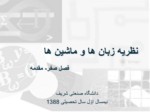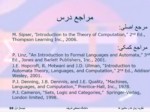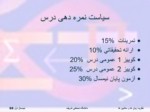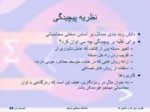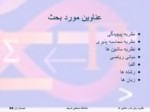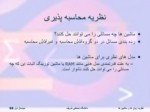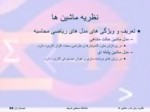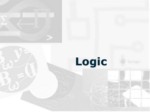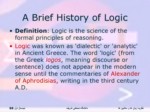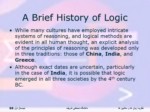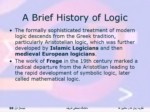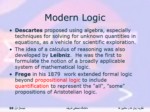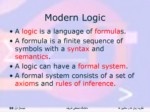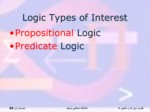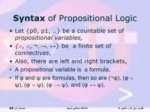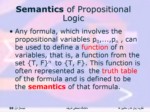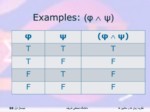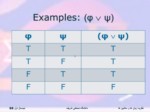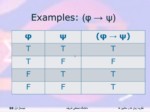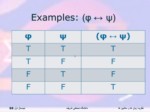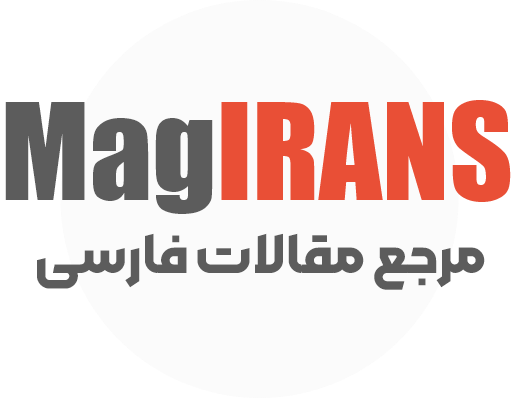بخشی از پاورپوینت
اسلاید 1 :
مراجع درس
- مرجع اصلی:
- Sipser, ”Introduction to the Theory of Computation,” 2nd Ed., Thompson Learning Inc., 2006.
- مراجع کمکی:
- Linz, “An Introduction to Formal Languages and Automata,” 3rd Ed., Jones and Barlett Publishers, Inc., 2001.
J.E. Hopcroft, R. Motwani and J.D. Ullman, “Introduction to Automata Theory, Languages, and Computation,” 2nd Ed., Addison-Wesley, 2001.
P.J. Denning, J.B. Dennnis, and J.E. Qualitz, “Machines, Languages, and Computation,” Prentice-Hall, Inc., 1978.
P.J. Cameron, “Sets, Logic and Categories,” Springer-Verlag, London limited, 1998.
اسلاید 2 :
سیاست نمره دهی درس
- تمرینات %15
- ارائه تحقيقاتي %10
- کوییز 1 عمومی درس %20
- کوییز 2عمومی درس %25
- آزمون پایان نیمسال %30
اسلاید 3 :
نظریه پیچیدگی
- دانش رده بندی مسائل بر اساس سختی محاسباتی
- برای غلبه بر پیچیدگی چه می توان کرد؟
–تغییر مسئله پس از کشف که عامل دشواری آن
–تقریب زدن راه حل مسئله
–ارائه روش هایی که در حالت متوسط عملکرد خوبی دارند؛
–استفاده از روش های تصادفی
- کاربردها
–به عنوان مثال در رمزنگاری، هدف این است که رمزگشایی با توان محاسباتی مهاجم غیرممکن باشد.
اسلاید 4 :
نظریه محاسبه پذیری
- ماشین ها چه مسائلی را می توانند حل کنند؟
- رده بندی مسائل در دو گروه قابل محاسبه و غیرقابل محاسبه
- مدل های نظری برای ماشین ها
–به علت قدرتمندی مدل هایی مانند RAM یا ماشین تورینگ اثبات این که چه مسائلی را می توانند حل کنند دشوار است.
اسلاید 5 :
نظریه ماشین ها
- تعریف و ویژگی های مدل های ریاضی محاسبه
–مدل ماشین حالت متناهی
- در پردازش متن، کامپایلرها و طراحی سخت افزار کاربرد دارد.
–مدل ماشین پشته ای
- در زبان های برنامه سازی و هوش مصنوعی کاربرد دارد.
اسلاید 6 :
A Brief History of Logic
- Definition: Logic is the science of the formal principles of reasoning.
- Logic was known as 'dialectic' or 'analytic' in Ancient Greece. The word 'logic' (from the Greek logos, meaning discourse or sentence) does not appear in the modern sense until the commentaries of Alexander of Aphrodisias, writing in the third century A.D.
اسلاید 7 :
- While many cultures have employed intricate systems of reasoning, and logical methods are evident in all human thought, an explicit analysis of the principles of reasoning was developed only in three traditions: those of China, India, and Greece.
- Although exact dates are uncertain, particularly in the case of India, it is possible that logic emerged in all three societies by the 4th century BC.
اسلاید 8 :
- The formally sophisticated treatment of modern logic descends from the Greek tradition, particularly Aristotelian logic, which was further developed by Islamic Logicians and then medieval European logicians.
- The work of Frege in the 19th century marked a radical departure from the Aristotlian leading to the rapid development of symbolic logic, later called mathematical logic.
اسلاید 9 :
Modern Logic
- Descartes proposed using algebra, especially techniques for solving for unknown quantities in equations, as a vehicle for scientific exploration.
- The idea of a calculus of reasoning was also developed by Leibniz. He was the first to formulate the notion of a broadly applicable system of mathematical logic.
- Frege in his 1879 work extended formal logic beyond propositional logic to include quantification to represent the "all", "some" propositions of Aristotelian logic.
اسلاید 10 :
Modern Logic
- A logic is a language of formulas.
- A formula is a finite sequence of symbols with a syntax and semantics.
- A logic can have a formal system.
- A formal system consists of a set of axioms and rules of inference.

